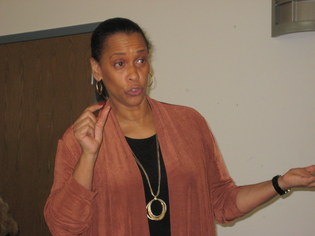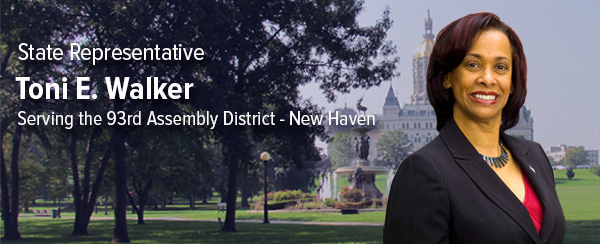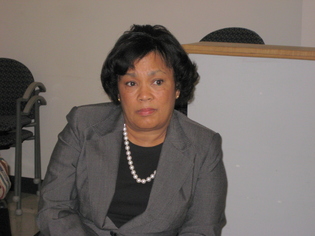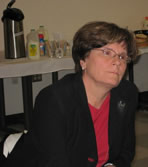
Melinda Tuhus Photo

December 12, 2007
“FWIZZIN” QUEST
by Melinda Tuhus
New Haven Independent

Some progress has come to the quest for juvenile justice, but advocates say more work remains to be done.
That was the message as the Connecticut Juvenile Justice Alliance held its annual legislative breakfast at Gateway Community College to discuss how youth advocates can keep their issues in the limelight.
In the last General Assembly, lawmakers voted to raise the age at which youth are treated as adult offenders from 16 to 18. Judging by the turnout at the breakfast, which was about half the number who came last year, perhaps many people thought the work was done. Chris Rapillo, from the office of the Chief Public Defender and a member of the Alliance steering committee, kicked off the meeting and said that’s not so.

“Raise the Age doesn’t go into effect until 2010. All of us who’ve been working on this can’t give up the fight. What we don’t want to see is the good things in our juvenile system watered down.”
Through the efforts of the Alliance, working with New Haven state legislators such as Sen. Toni Harp and Rep. Toni Walker, gains were made last year. Besides passage of the Raise the Age bill, changes were put in place to help youngsters who commit “status offenses” like skipping school or running away from home. As Abby Anderson (pictured), the Alliance’s executive director, explained, these are not crimes. However, youths who go before a judge and are told to stop that behavior but continue it, are violating a court order, and that’s an entré into the criminal justice system — which is where half those kids end up.
But as of Oct. 1 of this year, the 3,600 to 4,000 “status offenders” in Connecticut and their families — labeled “Families With Service Needs” or FWSN (pronounced “fwizzin”) — are eligible for new services. They can no longer be detained with youth who have committed crimes, and most families can get community-based services within two weeks. If they have a greater need, they can be referred to a Family Support Center within 48 hours, to access services including family mediation, educational advocacy, mentoring and crisis intervention. There are even respite beds available. The FWSN Advisory Board is scheduled to release additional recommendations at the end of December.

Toni Walker said she agrees with Gov. Rell’s vow to close the Connecticut Juvenile Training School. Youth are warehoused there for several hundred thousand dollars a year per kid; documented abuse of youthful offenders has occurred. But Walker (pictured above) also emphasized that funding should be put in place first for services, before millions are expended on “bricks and mortar” to build new facilities. She said, “As long as give people a platform to talk about building detention centers and more prisons, we lose the argument of making change in our community.”
Sen. Harp (pictured) said it will be key to tie juvenile issues into the big criminal justice issue in the 2008 General Assembly — re-entry to society after prison. “Re-entry is not just for people in the adult system; it’s for people across the whole spectrum. So you really need to be part of the whole conversation of re-entry and what that means both to the individual who’s re-entering but, as well, to the people in our communities.”

She also made a connection to the Petit family murders in Cheshire, noting that one of those accused had entered the criminal justice system as a young teen. Click here for more.
Since Raise the Age legislation doesn’t take effect until 2010, several people said it broke their hearts to see 16- and 17-year-olds still locked up with adult criminals. Janet Perrotti (pictured), a public defender in New Haven, said, “I’m so frustrated… You talk about kids who aren’t following court orders, they’re going to Manson [Youth Correctional Institution].” Click here fto hear more.